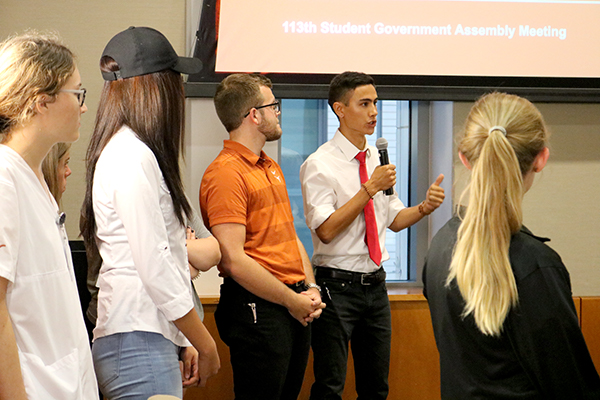Student Government proposed and passed legislation voicing support for Austin’s homeless population at its meeting Tuesday in response to Austin City Council reconsidering homelessness ordinances initially passed in June.
The current city ordinances allow people to camp, sit and lie down in public places if they do not create a safety issue or prevent use of public facilities. The assembly voted 19-15 in favor of AR 3, a resolution supporting the Council’s current city ordinances.
Austin City Council members Kathie Tovo and Ann Kitchen have proposed restricting these ordinances in West Campus and a large portion of downtown. Mayor Steve Adler and council member Greg Casar proposed an alternate plan to restrict the ordinances in other public areas, such as high pedestrian activity areas, while expanding housing for the homeless. They will discuss these proposals at their meeting Wednesday.
Jakob Lucas, speaker of the assembly, authored the legislation with philosophy junior Florent Marchais.
“It’s specifically to raise awareness for students, clarify our stance on the issue and also show the student body that SG is passionate about this,” government senior Lucas said. “Personally, my family has a history with house insecurity, so these issues touched my heart.”
Marchais said he thought the Austin City Council scheduled the vote too fast, and he wanted more students to know about the homelessness ordinances.
“As students, Austinites and West Campus residents, we can show we care about our homeless neighbors,” Marchais said.
Before voting on the bill, law school representative Jordan Cope began a formal debate about whether it was SG’s responsibility to pass this legislation.
“This does not mention the University and seems rather like an exploitation of SG’s power to influence politics beyond what actually affects the students,” law school student Cope said. “Our job isn’t to change the world. It’s to serve our students and our students’ interests.”
Cope said the assembly should set a precedent and draw a line between student affairs and non-student affairs.
“Our priority in SG is to protect the political diversity on this campus,” Cope said. “To allow students, of their own volition, to go to City Council meetings where they can change the world themselves. Not to hijack SG to define their beliefs for them.”
Liberal arts representative Jordan Clements said there were problems with the principle of the legislation.
“We shouldn’t just turn a blind eye to this, but these ordinances are not the solution,” finance sophomore Clements said. “We’ve seen the devastation of restaurants on Guadalupe (Street). If we want to revitalize the drag, we do not need homeless tents set up.”
Lucas said he disagreed with both of them and told the assembly a story about his mother’s experience with homelessness as a young pregnant woman.
“Homelessness is a student issue,” Lucas said. “Maybe it doesn’t affect you. Maybe it doesn’t affect your friends. But it is a student issue.”
University wide representative Kerry Mackenzie was one of the representatives who voted to pass the resolution.
“The debate came down to what the reach of SG would be in deciding student affairs,” said Mackenzie, a government and plan II sophomore. “Anything that significantly affects student life should be a part of the process here.”





















